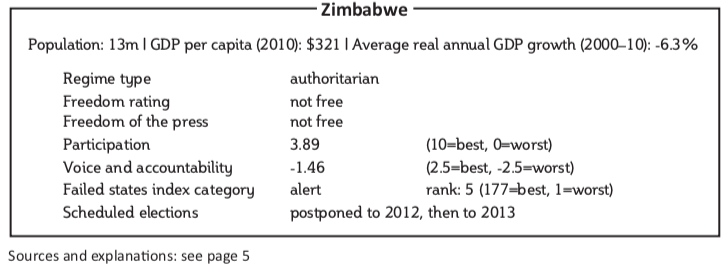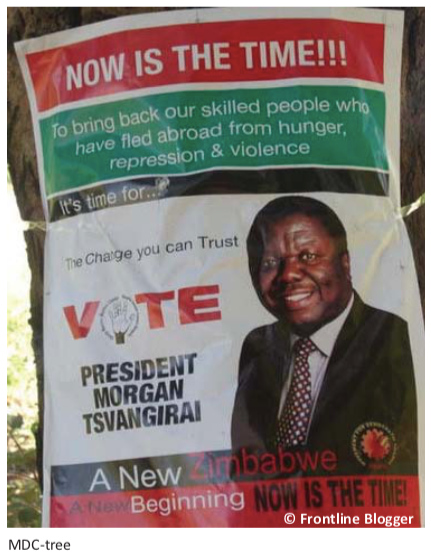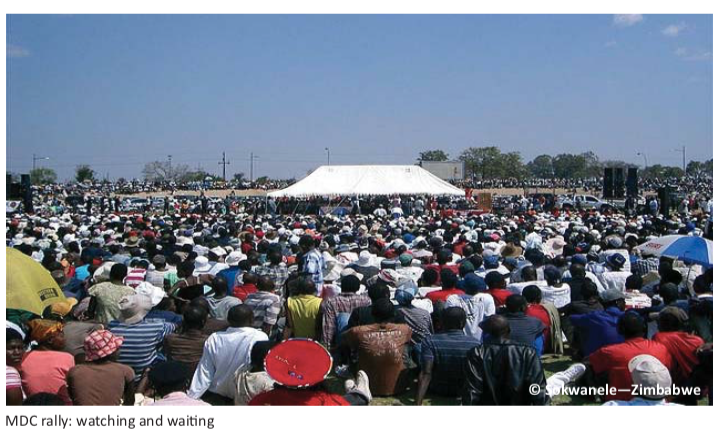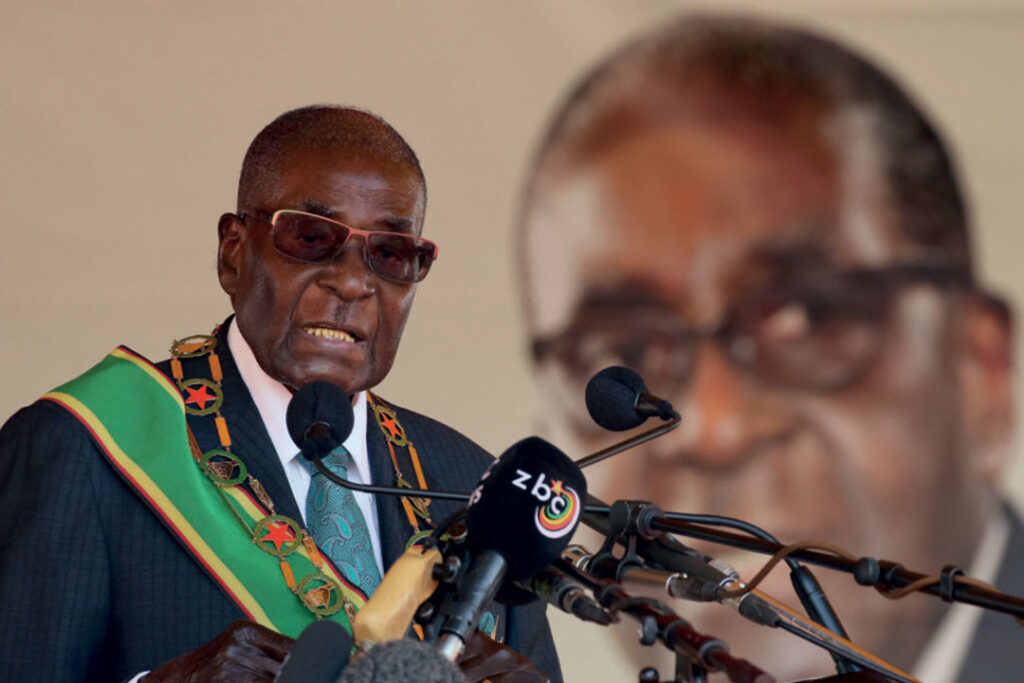Robert Mugabe may see victory again as Zimbabwe’s opposition fails to stand united.
by Ray Ndlovu
Sitting in his Bulawayo office, Welshman Ncube is preparing for Zimbabwe’s presidential elections, expected in 2013. He heads the smaller Movement for Democratic Change (MDC) party and rules out the possibility of uniting with the rival MDC-T led by Morgan Tsvangirai, the current prime minister.
“Our values and the things that we stand for are different and there is no way that we can talk of unity with Tsvangirai’s MDC,” Mr Ncube said.
Labelled a rookie by political opponents, Mr Ncube, 51, will be the youngest presidential candidate in an election race that pits him against Mr Tsvangirai, 60, and Zimbabwe’s president, Robert Mugabe, 88.
The two MDCs are the country’s main opposition parties. But it is Mr Tsvangirai’s that has taken the lead in the election race with the official launch in September of its campaign, themed “The Last Mile: Towards Real Transformation”.
The colourful rally in Bulawayo’s White City Stadium drew nearly 30,000 MDC-T supporters. Mr Tsvangirai urged them to persist in their “final push” to remove Mr Mugabe from power—a struggle that the MDC-T has been involved in since its founding in 1999.
At its origins, the MDC was made up of labour and student unions and bankrolled by wealthy white commercial farmers. It has not, however, realised its 13-year-old goal to dislodge Mr Mugabe, who has been in power since 1980.

Now in a coalition government with Mr Mugabe’s Zimbabwe African National Union Patriotic Front (ZANU-PF), the MDC-T is caught in a precarious balancing act: juggling its partnership in the three-year-old unity government while preserving its opposition party credentials.
Under the power-sharing deal agreed in 2008, ZANU-PF is in charge of “power ministries” such as defence, security, indigenisation and mining, whose operations tend to be hidden from public scrutiny. The MDC-T has been handed the “service ministries” such as health, finance and labour, which has weakened its decision-making clout in the unity government.
Tendai Biti is the MDC-T’s secretary-general as well as Zimbabwe’s finance minister. Persistent wage disputes between Mr Biti and the country’s 70,000 public servants have tarnished the MDC-T’s image. ZANU-PF has exploited these clashes to fan the fire of ill feeling towards the MDC-T ahead of the elections.
There are also strong indications that support for the MDC is weakening. A survey by US-based Freedom House published in August 2012 showed that support for the MDC has plummeted from 38% in 2010 to 20%. During the same period, ZANU- PF’s rose from 17% to 31%. The MDC’s top brass flatly rejected the results, issuing a press statement to say the Freedom House survey was conducted in a climate of “fear and intimidation” and therefore could not be accepted as true.
Some critics blame this weakness on the MDC’s lack of clear vision for a post- Mugabe Zimbabwe. “The MDC has failed to articulate precisely what it is that they are offering to Zimbabweans,” said Charles Taffs, president of the Commercial Farmers Union. “We don’t know what they stand for, their policies and what they really are all about.”

Another possible reason for the MDC’s drop in support is their split in 2005 into two parties. Different accounts are given to explain this divide. Mr Tsvangirai, in his autobiography “At The Deep End”, suggests that Mr Ncube’s “ambitiousness” was to blame. Mr Ncube, however, denies this and argues that ZANU-PF-type authoritarianism and lethargy had tainted the Tsvangirai-led MDC and forced him to quit.
The perceived inability of the opposition to stand united against Mr Mugabe could be turning voters against both factions of the MDC.
Senior MDC-T officials, however, remain optimistic that it is possible to defeat Mr Mugabe. “Our involvement in the unity government has not been doom and gloom as people would suggest,” said Douglas Mwonzora, the MDC-T national spokesperson. “We have done some things right and our involvement in the unity government was predicated on giving relief to our people, ravaged by hyper-inflation and food shortages. As we go for elections, people must vote for the MDC because it is the party that will bring economic stability in a post-Mugabe era.”
Political analyst Charles Mangongera warned against judging the MDC too harshly. “I think that it has done fairly well under very difficult conditions,” he said.
“I don’t think any other political party anywhere in the world has contested for political power under the same kind of conditions that the MDC has. Since the formation of the party, the leadership has been under constant attack from ZANU- PF and many of them have faced near-death experiences as a result of state-sanctioned brutality.”
Job Sikhala, president of MDC-99, another MDC breakaway, has accused ZANU-PF supporters of brutalising him. “I have been arrested 61 times, went to court 61 times and was acquitted all those times, which shows that those were all just trumped- up charges. The police are against anyone who is not ZANU-PF.”
Charity Charamba, spokeswoman for the Zimbabwe Republic Police (ZRP), denied allegations of police bias. “No one is above the law,” she said. “If a report is made, then the police will investigate.”
Mr Mugabe is focusing his election campaign on the controversial indigenisation programme in which he is ratcheting up support for himself by parcelling out 51% of shares in foreign-owned companies to locals. In addition, the opposition accuses state institutions such as the Zimbabwe Broadcasting Corporation, the ZRP and the registrar- general, who oversees the electoral roll, of carrying out their duties in a partisan manner.
Mr Mugabe and Mr Tsvangirai have faced off in previous presidential elections, held in 2002 and 2008—and the outcome at each turn was hotly disputed. Next year’s election will be the third face-off and indications are that the contest will be a nail- biting finale.
The military, however, may emerge as the kingmaker. Several of its top members have publicly indicated that they would never recognise a Tsvangirai or MDC victory. Zimbabwe’s opposition parties may yet again have to turn to the Southern African Development Community to help slam the brakes on a ZANU-PF that has shown dangerous signs of renewed belligerence.




